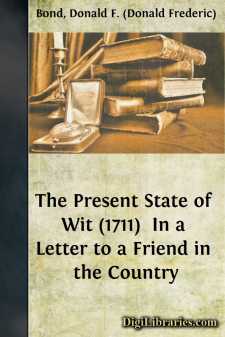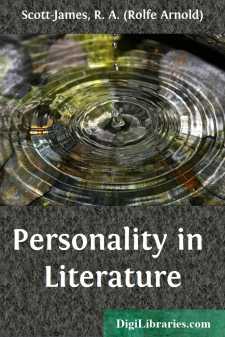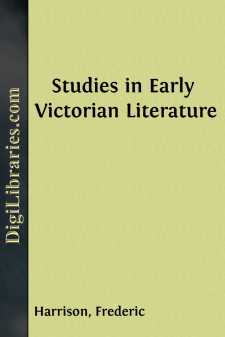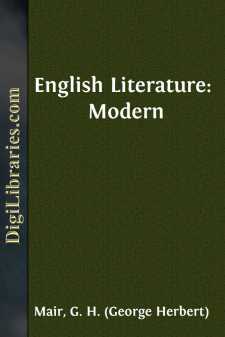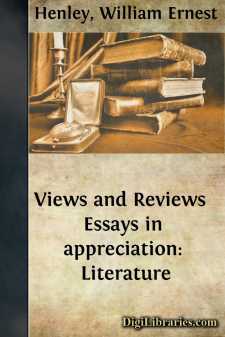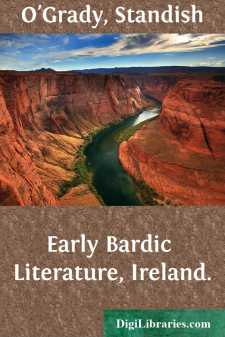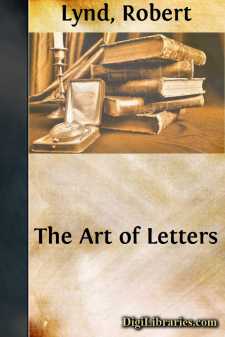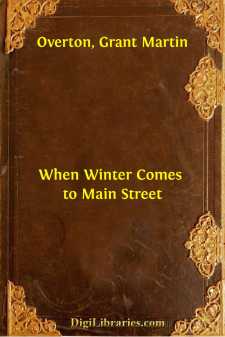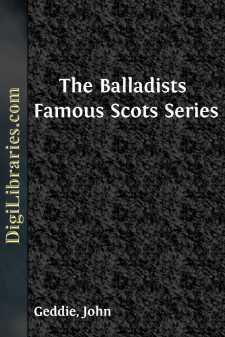Literary Criticism
- American 18
- Ancient and Classical 3
- Asian 1
- Australian & Oceanian 1
- Books & Reading 8
- Caribbean & Latin American 2
- Drama 2
- English, Irish, Scottish, Welsh
- European 7
- General 37
- Horror 1
- Humor 2
- Jewish 2
- Medieval 2
- Middle Eastern 3
- Poetry 7
- Renaissance 6
- Russian & Former Soviet Union 1
- Shakespeare 27
English, Irish, Scottish, Welsh Books
Sort by:
INTRODUCTION Gay's concern in his survey of The Present State of Wit is with the productions of wit which were circulating among the coffee-houses of 1711, specifically the large numbers of periodical essays which were perhaps the most distinctive kind of "wit" produced in the "four last years" of Queen Anne's reign. His little pamphlet makes no pretence at an analysis of true...
more...
THE DEGRADATION OF BEAUTY Some time ago I found myself at an exhibition of Post-Impressionist pictures, under the ægis of an artist who was himself of that persuasion. Indeed, he was one of the exhibitors, and I was constrained to express my opinions in the form of questions. We passed before a picture which to my untutored eyes was formless, meaningless and ugly. It was by a well-known artist, and my...
more...
CHARACTERISTICS OF VICTORIAN LITERATURE That which in England is conveniently described as the Victorian Age of literature has a character of its own, at once brilliant, diverse, and complex. It is an age peculiarly difficult to label in a phrase; but its copious and versatile gifts will make it memorable in the history of modern civilisation. The Victorian Age, it is true, has no Shakespeare or...
more...
CHAPTER I THE RENAISSANCE (1) There are times in every man's experience when some sudden widening of the boundaries of his knowledge, some vision of hitherto untried and unrealized possibilities, has come and seemed to bring with it new life and the inspiration of fresh and splendid endeavour. It may be some great book read for the first time not as a book, but as a revelation; it may be the first...
more...
DICKENS A ‘Frightful Minus’ Mr. Andrew Lang is delightfully severe on those who ‘cannot read Dickens,’ but in truth it is only by accident that he is not himself of that unhappy persuasion. For Dickens the humourist he has a most uncompromising enthusiasm; for Dickens the artist in drama and romance he has as little sympathy as the most practical. Of the prose of David Copperfield and Our...
more...
by:
Standish O'Grady
Scattered over the surface of every country in Europe may be found sepulchral monuments, the remains of pre-historic times and nations, and of a phase of life will civilisation which has long since passed away. No country in Europe is without its cromlechs and dolmens, huge earthen tumuli, great flagged sepulchres, and enclosures of tall pillar-stones. The men by whom these works were made, so...
more...
by:
Robert Lynd
I.—Mr. Pepys Mr. Pepys was a Puritan. Froude once painted a portrait of Bunyan as an old Cavalier. He almost persuaded one that it was true till the later discovery of Bunyan’s name on the muster-roll of one of Cromwell’s regiments showed that he had been a Puritan from the beginning. If one calls Mr. Pepys a Puritan, however, one does not do so for the love of paradox or at a guess. He tells...
more...
Chapter I THE COURAGE OF HUGH WALPOLE i Says his American contemporary, Joseph Hergesheimer, in an appreciation of Hugh Walpole: “Mr. Walpole’s courage in the face of the widest scepticism is nowhere more daring than in The Golden Scarecrow.” Mr. Walpole’s courage, I shall always hold, is nowhere more apparent than in the choice of his birthplace. He was born in the Antipodes. Yes! In that...
more...
by:
John Geddie
CHAPTER I BALLAD CHARACTERISTICS'Layés that in harpingBen y-found of ferli thing;Sum beth of wer, and sum of wo,Sum of joye and mirthe also;And sum of treacherie and gile;Of old aventours that fell while;And sum of bourdes and ribaudy;And many ther beth of faëry,—Of all things that men seth;Maist o' love forsoth they beth.'The Lay of the Ash. Who would set forth to explore the realm...
more...
by:
Henry Coppee
Chapter I. The Historical Scope of the Subject. . . . . . . . . . Literature and Science. There are two words in the English language which are now used to express the two great divisions of mental production—Science and Literature; and yet, from their etymology, they have so much in common, that it has been necessary to attach to each a technical meaning, in order that we may employ them without...
more...


